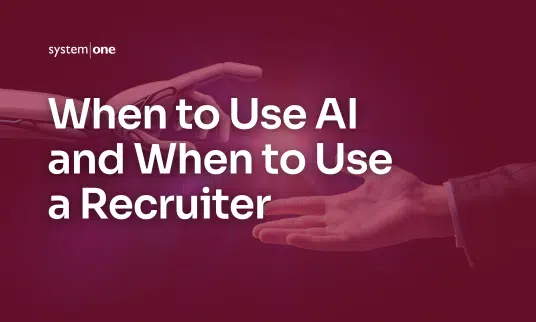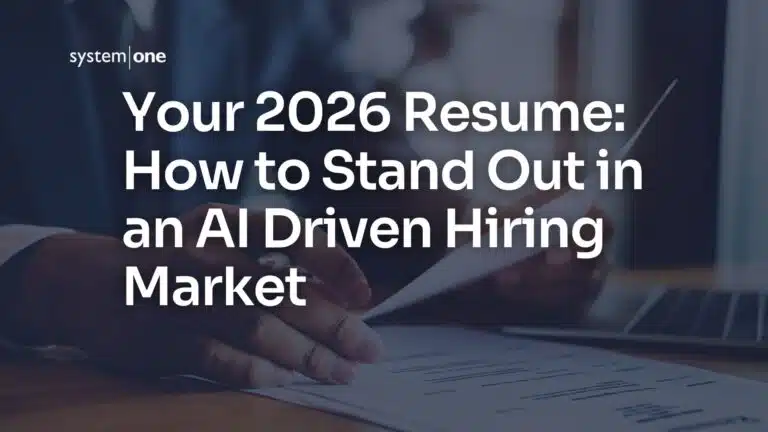When to Use AI and When to Use a Recruiter

In today's job market, AI has become a powerful ally for job seekers, offering tools to streamline tasks like resume optimization and interview preparation. We've previously covered how to leverage AI effectively in your job search. However, AI isn't a one-size-fits-all solution; it's a supplement, not a replacement for human elements. Knowing when to lean on AI for efficiency and when to tap into the expertise of recruiters or personal networking can make all the difference. Recruiters bring insider knowledge and exclusive connections that AI can't replicate.
Researching Jobs and Companies
Before diving into applications, research is essential to identify roles that align with your skills, values, and career goals.
When to Use AI: AI excels at data collection and analysis. Tools like job search engines with AI features (e.g., LinkedIn's AI-powered job recommendations or ChatGPT for summarizing company reviews) can quickly scan job boards, analyze trends in job descriptions, and highlight in-demand skills across industries. For instance, you could prompt AI to "Compare salary ranges and required skills for software engineering roles." This saves time and provides a broad overview, helping you spot patterns without manual sifting.
When to Use a Recruiter: Recruiters offer nuanced, real-time insights that go beyond public data. They often have access to unposted opportunities, internal company culture details, and hiring manager preferences. If you're targeting specific industries or companies, System One recruiters can provide tailored advice on the market or upcoming openings. Their exclusive relationships with large private and public organizations enable them to gauge fit more accurately than an algorithm.
Pro Tip: Start with AI for initial broad research, then consult a recruiter to refine your target list.
Creating a Resume
Your resume is your first impression. It needs to showcase your unique value while passing applicant tracking systems (ATS).
When to Use AI: Leverage AI here for optimization. Tools like resume builders or AI assistants can identify key phrases, skills, and keywords from job descriptions, ensuring your resume aligns with ATS requirements. For example, input your experience into an AI tool and ask it to "Incorporate these keywords naturally while maintaining my voice." AI can also suggest formatting improvements, quantify achievements (e.g., turning "Managed a team" into "Led a 10-person team to achieve 20% revenue growth"), and even generate bullet points based on your input.
When to Use a Recruiter: While AI handles the basics, recruiters provide the human touch. They interact with hiring managers daily and know exactly what stands out beyond keywords. A recruiter can review your resume, suggest storytelling tweaks to highlight your narrative, and ensure it resonates. At System One, our recruiters specialize in tailoring resumes for sectors like engineering and technology (to name a few), drawing from exclusive insights into what top employers seek.
Pro Tip: Use AI for the first draft, then polish it with the help of a recruiter. This balances automation with authenticity.
Applying to Jobs
The application phase is where strategy meets execution. It's not just about volume.
When to Use AI: AI can automate parts of this, like filling forms or suggesting jobs via platforms with matching algorithms. However, mass-applying with AI-generated materials often backfires. Hiring managers spot impersonal submissions and may dismiss them.
When to Use a Recruiter: Prioritize quality over quantity here. Recruiters have exclusive relationships with hiring managers, allowing them to submit your application directly and advocate for you. They help select roles where you have a genuine edge, avoiding the spray-and-pray approach. At System One, our recruiters work with large private and public organizations, often placing candidates in roles not advertised publicly, which boosts success rates through personalized introductions.
Pro Tip: Limit AI to organization (e.g., spreadsheets for tracking), and let recruiters handle submissions for high-priority opportunities to ensure advocacy and relevance.
Preparing for Interviews
Interviews test not just knowledge but also communication and cultural fit.
When to Use AI: AI is invaluable for practice and preparation. Use tools like interview simulators or AI chatbots to role-play common questions (e.g., "Behavioral interview prep for a project manager role: Simulate responses to 'Tell me about a time you handled conflict'"). It can analyze your answers for clarity, suggest improvements, and even research company-specific questions. For technical roles, AI can generate mock coding problems or explain concepts.
When to Use a Recruiter: Recruiters provide insider prep that's hard to beat. They know the interview format, panelists' styles, and what the company truly values.. System One recruiters can clarify the employer's process, share recent feedback from similar candidates, as well as help you negotiate.
Pro tip: System One has a lot of resources to help with interview prep. Check them out here!
Networking and LinkedIn Engagement
Building connections is the backbone of long-term career success.
When to Use AI: AI can help craft engaging LinkedIn content, such as post ideas or comment suggestions. For example, prompt it to "Generate a LinkedIn post about my transition from sales to tech, incorporating industry trends." It can also analyze profiles for connection suggestions or optimize your headline and summary for visibility.
When to Use a Recruiter: LinkedIn is fundamentally a networking tool, and AI can't build genuine relationships. Recruiters facilitate introductions, endorse your profile, or connect you with decision-makers. They can advise on content that attracts the right audience without sounding robotic. Hiring managers are wary of AI-generated posts that lack a personal touch. Use recruiters to expand your network through events or referrals.
Pro Tip: Utilize AI for content generation, but always edit to infuse your voice. Rely on recruiters for strategic networking to turn online interactions into real opportunities.
Following Up and Negotiating Offers
Post-application and interview follow-ups can seal the deal.
When to Use AI: AI can draft professional follow-up emails or suggest negotiation scripts based on market data (e.g., "Based on my experience, what's a fair salary ask for this role?"). It's useful for researching benchmarks on salary, benefits, and perks.
When to Use a Recruiter: Recruiters handle follow-ups seamlessly, often communicating directly with employers to keep your candidacy top-of-mind. In negotiations, they're advocates who know the company's flexibility and can push for better terms without risking the offer. System One recruiters excel in this area, leveraging their relationships to secure competitive packages.
Pro Tip: Use AI for templates and data, but let recruiters lead negotiations for optimal outcomes.
AI aids in the job search by handling repetitive tasks and providing quick insights, but it lacks the empathy, advocacy, and insider access that recruiters offer. By using AI for efficiency in areas like research and drafting, and recruiters for strategy and personalization, you'll create a more effective, human-centered approach. At System One, our recruiters are here to partner with you. Reach out to blend the best of both worlds and land your next role with confidence.
Looking for business solutions?
Explore System One

